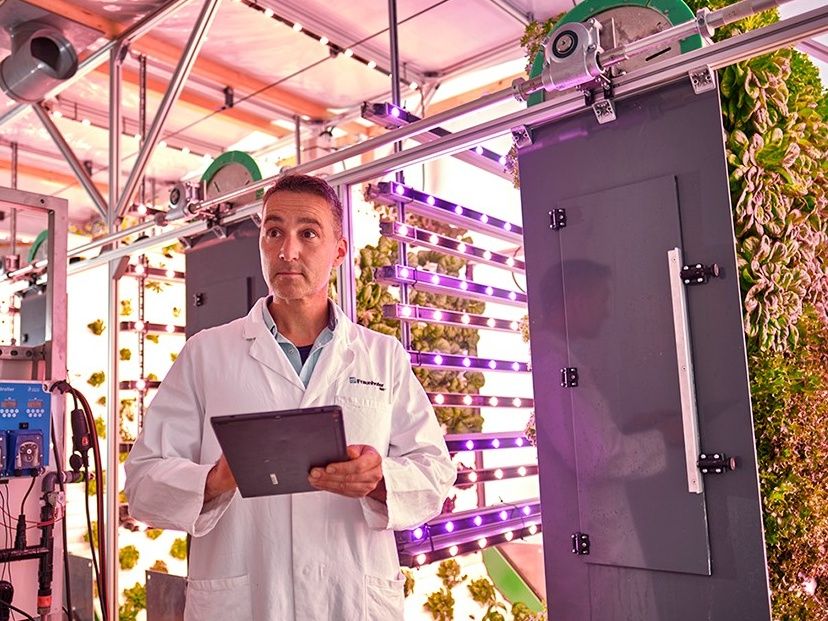Fraunhofer presents recommendations for action for resilient value chains in food production
Advertisement
Our food supply is highly dependent on locally and globally interconnected value chains, which are characterized by, among other things, fragile supply chains and disruptions of various kinds. Resilient food systems are therefore essential to guarantee basic supplies. It is not only the delivery of food that is important; it is above all crucial that products that are safe in terms of health reach the consumer. The prerequisite for this is a resilient production process. Using the examples of "vertical farming" and "novel vegetable oil mills", teams of researchers from the Fraunhofer Institutes IME, IPT and IVV investigated strategies for strengthening resilience as part of the "ReSearch" initiative. The findings are summarized in the newly published white paper "Resilient value chains for food production", which is now available.
Due to current crises and resource scarcity, there is great pressure for action across all sectors to strengthen the resilience of food production - this is the result of surveys and discussions with trade associations and companies in the food industry, which the research team of the Fraunhofer initiative "ReSearchL" has produced. In the context of production, companies or manufacturing systems that can constantly adapt to internal and external changes and disruptions in complex, rapidly changing production and value-added networks, among other things, and that can deliver safe and high-quality products even under changing conditions are considered to be resilient.
To assess resilience in food production, researchers looked at two dimensions: the technical resilience of the production facilities used and the ecosystem resilience of the food grown. Scientists from the Fraunhofer Institute for Molecular Biology and Applied Ecology IME, together with the Fraunhofer Institute for Production Technology IPT, investigated both resilience dimensions using the Fraunhofer IME's novel OrbiPlant® vertical farming platform technology. The Fraunhofer Institute for process engineering and Packaging IVV analyzed ecosystem resilience using the "novel vegetable oil mill" model. As a result, both cases show the successful application of a resilient system architecture: For this purpose, a digital shadow was first designed for both use cases with the help of digital technologies based on possible incidents in order to determine influencing variables and product quality variables.
Resilience for indoor/vertical farming production systems
Fraunhofer IME scientists investigated relevant disturbance cases in the context of an exemplary basil production based on their novel OrbiPlant® vertical farming platform technology together with the Fraunhofer IPT in order to derive possible approaches for establishing a resilient production process. Indoor food production systems such as this present specific challenges with regard to their technical resilience and also ecosystem resilience, which arise from the protected production environment with simultaneously high plant densities. Of particular relevance here are disturbance variables in the area of plant system technology and the plant target product. In case of a disturbance, they can lead to a critical crop failure within a short time.
In this application, the researchers induced technical and plant-specific disturbances on two OrbiPlant® vertical farming systems, which could be clearly detected using suitable sensor technology and real-time recording of the system data. The resilience approach pursued goes beyond simple plant monitoring with fault notification
and in the future can make an important contribution to securing the supply of both
health safe and high quality food.
Digital shadow and sensor concepts for a novel vegetable oil mill
To consider the resilience of an ecosystem, the Fraunhofer IVV team used a new vegetable oil mill as a case study: The Central European vegetable oil market is dominated by large oil mills with a throughput of one million tons per year, processing almost exclusively rapeseed or sunflower. However, this lack of feedstock diversity, the large production facilities, the low value of domestic feed meals, and the resulting dependence on shipments from Eastern Europe, Asia, and South America make the system highly vulnerable to crop failures, plant diseases, and more.
The project focused on oilseed pressing, as it is the key process step in oil extraction. To qualify system resilience, powerful models were used to investigate which continuity and restart strategies can minimize the impact of disruptive scenarios. For this purpose, the digital shadow of a novel oil mill including a sensor concept was created and validated by investigating two selected disturbance scenarios: the complete and the partial failure of the power supply, respectively. Finally, the researchers derived recommendations for action to make oil mill processes more resilient. These include a comprehensive sensor concept and a number of other measures.
Whitepaper
The whitepaper, which is now available free of charge, is the result of the initiative "Resilient System Architecture for Securing Food Production" (ReSearchL). The team of researchers from the Fraunhofer Institutes IVV, IPT and IME has set itself the goal of making the resilience of the system architecture of food production analyzable, assessable and designable. The focus is primarily on obtaining relevant data in order to generate solution approaches for improved resilience.
The white paper "Resilient value chains for food production" can now be requested free of charge from the Fraunhofer IVV website.

Vertical Farming
Fraunhofer
Note: This article has been translated using a computer system without human intervention. LUMITOS offers these automatic translations to present a wider range of current news. Since this article has been translated with automatic translation, it is possible that it contains errors in vocabulary, syntax or grammar. The original article in German can be found here.

































































